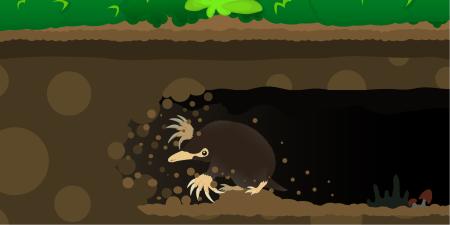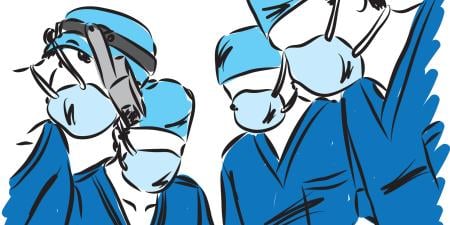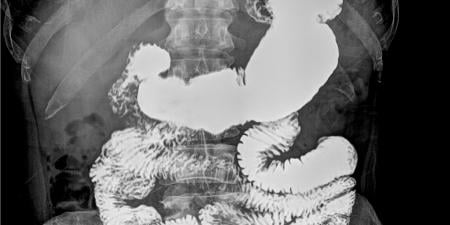Years ago what started me writing was the total avoidance of all issues related to feelings during my medical school years and surgical training. I was not taught to take care of myself or treat my patients as human beings. I was turned into a wonderful technician who was not supposed to feel. When I wrote to the people who trained me, telling them this and asking them to change the way they did things, they never wrote back. Try standing up at Grand Rounds or Morbidity and Mortality Conferences and discussing how you feel about the death of your patient due to an error in care—like transplanting the wrong organs—and watch the reaction you get. The discussion is all about what you think and not how you feel. When surgeons at Yale were asked, "How does it feel to be a surgeon?" They all started their answers with, "I think it's like . . . ."
How many surgeons are trained to talk to patients? As I have written, a scalpel can kill or cure and so can words, because wordswordswords can become swordswordswords. Scalpels and words are instruments which can cure or kill. What most often trains physicians is their own, or their loved one's disaster or illness. Then they write books, because the tourist has become a native and now understands the experience and no longer just treats the diagnosis and illness. I became a much better surgeon after a week in the hospital. All medical students should have to spend time in a hospital bed before graduation.
I spontaneously started to keep a journal when I found it very hard to remain a surgeon because of all the things I couldn't cure and the complications related to my being human and not God or a Medical Deity. Why was this painful? Because if you cannot bring forth your feelings they will destroy you. Physicians develop PTSD but never have it treated. By journaling I could get what was within me out. One evening I realized the extent to which what was stored within had not been dealt with; I looked at the journal notes I had written during the day and couldn't remember what they were about. To look at the words "Boy in ER" and not remember the disaster the words referred to revealed to me what I was not dealing with. My wife also helped me when she found my hidden journal and remarked there was nothing funny in it. I told her my life wasn't funny and she then went on to recount funny stories about the hospital that I had shared with her and our 5 children, none of whom is a physician, at the dinner table. She helped me to remember the joyful moments which occurred each day and record them in my journal too.
I became a pediatric and general surgeon for healthy reasons, an issue that is not dealt with by medical schools. I loved people, found science fascinating, liked fixing things, and was an artist so I wanted to use my skilled hands in some profession (not knowing you could earn a living as an artist). So it hurt when children told me they hated me every morning while I debrided their burns. If you became a doctor because you are fascinated by the human body you will have a problem because people come in the body.
So words and swords became my tools when a patient of mine, sitting beside me at a workshop she was attending because of cancer and I was attending because of My Disease (MD), turned to me and said, "You're a nice guy and I feel better in the office with you but I can't take you home with me. So I need to know how to live between office visits." That sentence led me to change my life. I offered support groups to all our patients, through letters from our office, to help them live longer, better lives and less than 20 percent of patients had any interest in attending. That was my wake-up call, revealing to me that I didn't know my patients as people. I put my desk against the wall so I was not separated from the people I cared for and learned to share their experience and speak to them in ways that could help them survive.
By becoming more aware of the effect of my words as well as my scalpel, I was better able to care for myself and my patients. I returned to painting every evening to help me to heal the pain of the day and realized one evening I was painting portraits and not natural scenes. When you lose track of time, you are in a healing trance; painting and operating have always done that for me. I awakened to the fact I that needed to see the people I was treating and not just their afflictions, which I often could not cure. I learned when the sword cannot cure, the word can heal.
The sickest portrait I have done was a self portrait. When our pets and my family were tired of sitting for me, I put up a mirror and painted a self portrait wearing cap, mask, and gown. I was covering up even in a painting. When I wrote an article for the American College of Surgeons entitled, "Surgery; Mechanical or Healing Art", the title of the course I taught at Yale, they refused to publish the painting. My smiling face was okay but not the portrait.
One last bit of advice. If you are unhappy as a surgeon you are the problem. You can quit surgery or change your attitude, either one works. I worked at a Subway franchise for one of our sons and had a knife, gloves, and a uniform. It was great. If people wanted a sandwich they had to answer a question. I asked things like, "What can I pray for you? What's the best day of your life? How would you introduce yourself to God?" and therapy started over a sandwich.
The other way to be therapeutic is to wear a bandage or make rounds using a cane. I shaved my head 30 years ago and people knew I was troubled. I uncovered skin not feelings. When patients see you are wounded they will share things with you they have never told you before because now you are a wounded healer and will understand. Thornton Wilder wrote about an angel who refuses to heal a doctor of his emotional pain, "Without your wound where would your power be….In love's service only the wounded soldier can serve." After I shaved my head people lined up to talk to me at the hospital.
By the way, the burned child who hated me called years later called to tell me her father had died and ask me to be her father at her wedding. Why? Because I taught her that when you are giving love you are beautiful and no one notices your scars. Madeline is a nurse today and one of my CDs, that is, a Chosen Daughter, and I am her CD, Chosen Dad. That is why words are what surgery is about, and not just making incisions. So learn to use them correctly as you do your other instruments.
A patient being discharged told me he was not giving me a gift as he was everyone else who cared for him.
"Why not?"
"You're always angry."
"I didn't like what I had to do to you."
"But you took it out on me."
"I'm sorry."
"Okay, here's a bottle of liquor."



